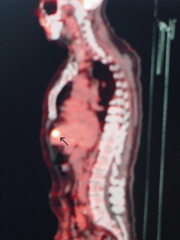Feb 28 2005
 Cancer patients at Mercy & Unity Hospitals have access to the latest in diagnostic imaging to assess the presence and extent of most types of cancer.
Cancer patients at Mercy & Unity Hospitals have access to the latest in diagnostic imaging to assess the presence and extent of most types of cancer.
Positron Emission Tomography (PET) combined with Computerized Tomography (CT) imaging can assist in determining the extent and stage of tumors. PET/CT is also useful in assessing a cancer patient’s progress in a given treatment course.
“I feel really good about having this technology,” said Dan Nalezny of Ramsey, Minn. Nalezny, who is 54, has had four scans since he was diagnosed with colon cancer in 2001. Now in remission, Nalezny says PET/CT has been used to verify other test results by scanning his entire body for traces of cancer.
“The test requires an IV injection of a tracer or dye. Then, the actual scan is 35 to 40 minutes, and you have to lie still with your hands over your head – that’s where the discomfort is,” he said. “But it’s been very helpful to determine where I am in my treatment.”
“No other imaging technology compares with PET/CT’s unique ability to image functional processes, such as tumor metabolic activity,” said Mark Wilson, M.D., radiologist from Suburban Radiologic Consultants, Ltd., who practices at Mercy & Unity. “This is valuable information when deciding a patient’s best course of treatment.”
While PET/CT at Mercy & Unity is primarily used in cancer care, future uses include diagnosing and determining the extent of neurological disorders, such as Alzheimer’s disease and epilepsy, and damage to cardiac muscle after a heart attack.